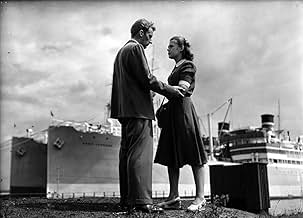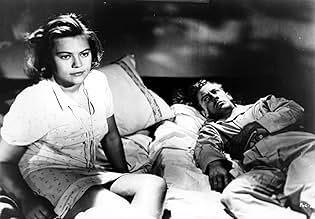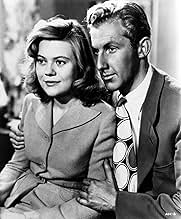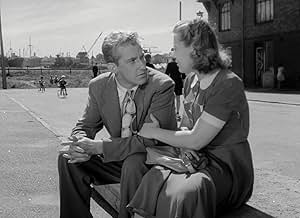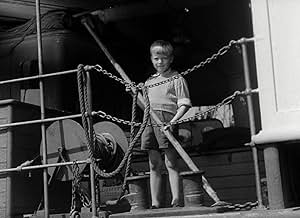IMDb-BEWERTUNG
6,6/10
2988
IHRE BEWERTUNG
Ein selbstmordgefährdetes Fabrikmädchen aus der Besserungsanstalt, das ihrer überheblichen Mutter entfliehen will, verliebt sich in einen Matrosen, der ihr ihre Vergangenheit nicht verzeihen... Alles lesenEin selbstmordgefährdetes Fabrikmädchen aus der Besserungsanstalt, das ihrer überheblichen Mutter entfliehen will, verliebt sich in einen Matrosen, der ihr ihre Vergangenheit nicht verzeihen kann.Ein selbstmordgefährdetes Fabrikmädchen aus der Besserungsanstalt, das ihrer überheblichen Mutter entfliehen will, verliebt sich in einen Matrosen, der ihr ihre Vergangenheit nicht verzeihen kann.
Edvard Danielsson
- Klockaren
- (Gelöschte Szenen)
Carl Deurell
- Prästen
- (Gelöschte Szenen)
Kolbjörn Knudsen
- En sjöman
- (Gelöschte Szenen)
Gunnar Nielsen
- En herre (1)
- (Gelöschte Szenen)
Empfohlene Bewertungen
Berit is a factory girl fresh out of reformatory school and fresh from an attempted suicide by drowning when she meets a sailor named Gösta at a dance club. He beds her down that night, and later, when the two become lovers, allows himself to assume that he was the first man to do so. Meanwhile, Berit is desperate to be free: free from the badgering and manipulation of the mother she is forced to live with, free of the dirty work of the factory and free of her social worker and the constant threat of returning to reformatory school. Her already unhappy life is complicated when an old friend from the school desperately needs her help.
Personal freedom is a major theme of this lovely, bleak, but not pessimistic, early Ingmar Bergman movie. We yearn for Berit to find freedom from her unpleasant life, and most of all freedom from loneliness, just as we hope Gösta can free himself from jealousy and the specters of long-gone rivals for his affections.
Personal freedom is a major theme of this lovely, bleak, but not pessimistic, early Ingmar Bergman movie. We yearn for Berit to find freedom from her unpleasant life, and most of all freedom from loneliness, just as we hope Gösta can free himself from jealousy and the specters of long-gone rivals for his affections.
This is a very nice early Ingmar Bergman film, one that's well composed, touches on daring subjects, and has a gritty, neorealist feel to it. Via flashbacks and nonlinear storytelling, we gradually come to understand a troubled young woman (Nine-Christine Jönsson), who we first see jumping into the water in a suicide attempt. We see the difficulty of her growing up with parents who are in a bad marriage, and the profound impact this has on her life. We see teenage rebellion, and feelings of loneliness and depression. We see female sexuality for enjoyment and as a way of escaping reality, but then facing the double standard in society. And we see a black market abortion, with the film showing both the hypocrisy and the unfairness of these not being legal in Sweden in 1948, except for "socio-medicinal" grounds like the eugenic case it refers to. All of these things and some cool working class scenes on the docks and in a factory give the film a dark sense of realism.
The performance from Jönsson is excellent, and the role and her portrayal reminded me of Harriet Andersson from some of Bergman's films in the 1950's. She plays vulnerable, defiant, loving, and lonely all very well, and comes across as a feminist hero to me. Early on we see her deftly fend off the supervisor's creepy suggestions for a little payback after he's put in a good word for her, and she puts up with several crude things like that over the course of the film. We can see the potential and goodness in her character, but at the same time, she has to wear her reform school past like a scarlet letter, and has difficulties coping in a world that judges instead of empathizes with her. She has seen enough of the world and of men even at her young age to doubt her lover (Bengt Eklund) will stick around, and the scene the two have in the hotel room, interrupted by her friend (Mimi Nelson), is one of the film's best. The scene where she exchange slaps with her mother (Berta Hall) is also a good one.
The film's frank references to premarital sex, abortion, and a brief bit of nudity were all things American films would not touch for years, and just as important are its questioning of authority and social conventions. The film was only released in the UK after 10 years with an X rating, and only released in America in 1963 after Bergman had won 2 Oscars. There are some moments when the young director should have exercised restraint, such as when Jönsson writes 'lonely' on the mirror in lipstick, or when Eklund rages in an overwrought way in the company of a prostitute, but all in all, he's in fine form here. This is a good, meaty film on its own, and it's even more interesting because of where it stands in his oeuvre. Well worth seeing, and deserves a higher average rating.
The performance from Jönsson is excellent, and the role and her portrayal reminded me of Harriet Andersson from some of Bergman's films in the 1950's. She plays vulnerable, defiant, loving, and lonely all very well, and comes across as a feminist hero to me. Early on we see her deftly fend off the supervisor's creepy suggestions for a little payback after he's put in a good word for her, and she puts up with several crude things like that over the course of the film. We can see the potential and goodness in her character, but at the same time, she has to wear her reform school past like a scarlet letter, and has difficulties coping in a world that judges instead of empathizes with her. She has seen enough of the world and of men even at her young age to doubt her lover (Bengt Eklund) will stick around, and the scene the two have in the hotel room, interrupted by her friend (Mimi Nelson), is one of the film's best. The scene where she exchange slaps with her mother (Berta Hall) is also a good one.
The film's frank references to premarital sex, abortion, and a brief bit of nudity were all things American films would not touch for years, and just as important are its questioning of authority and social conventions. The film was only released in the UK after 10 years with an X rating, and only released in America in 1963 after Bergman had won 2 Oscars. There are some moments when the young director should have exercised restraint, such as when Jönsson writes 'lonely' on the mirror in lipstick, or when Eklund rages in an overwrought way in the company of a prostitute, but all in all, he's in fine form here. This is a good, meaty film on its own, and it's even more interesting because of where it stands in his oeuvre. Well worth seeing, and deserves a higher average rating.
6sol-
An early film from Ingmar Bergman, it is just as interesting on a visual scope as his films usually are, with the docklands filmed well and good use of panning and dolly work throughout. In terms of story and acting though, this is rather ordinary stuff, despite some interesting ideas and philosophies about freedom. It seems the easy way to out to just classify this film as interesting but not up to the standard that Bergman would later set, however I cannot think of much else to say here. It certainly is not as thought-provoking and intense as some of his later films, and for those not interested in Bergman or clever camera movement, I could easily imagine this piece coming across as boring.
The sailor Gösta Andersson (Bengt Eklund) quits sailing in Gothenburg and while walking in the harbor, he rescues the worker Berit Irene Holms (Nine-Christine Jönsson) that has just jumped into the sea attempting to commit suicide. Then he meets his friends and finds a job of dockworker with them. A couple of days later, Gösta and Berit meet each other by chance in a ball and they have sex at her house. Gösta dates the needy Berit that falls in love with him and decides to tell her past in a reformatory school and her former relationships to him. But the twenty-nine year old man is not ready to forget the past of Berit and forgive her.
"Hamnstad" is the fifth Bergman's film with a bitter and bleak love story of a needy and lonely girl raised in a dysfunctional family with a domineering mother that is sent to a reformatory school, and her boyfriend that likes her, but can not forgive her past. This is the typical anti-Hollywood love story, with themes that seems to be ahead of time (for a 1948 film), such as abortion and one night stand between the couple that has just met each other. My vote is eight.
Title (Brazil): "Porto" ("Seaport")
"Hamnstad" is the fifth Bergman's film with a bitter and bleak love story of a needy and lonely girl raised in a dysfunctional family with a domineering mother that is sent to a reformatory school, and her boyfriend that likes her, but can not forgive her past. This is the typical anti-Hollywood love story, with themes that seems to be ahead of time (for a 1948 film), such as abortion and one night stand between the couple that has just met each other. My vote is eight.
Title (Brazil): "Porto" ("Seaport")
While Gosta, a seaman, arrives in Gothenburg, a young girl, Berit, makes a suicide attempt in the city harbour. After saving her, a rather promising relationship seems to begin but much work needs to be done from both of them in order to be together.
In 1948, Ingmar Bergman seems already familiar with the themes that he will never stop examining throughout his career. He observes and studies human behavior in everyday circumstances, in an effort to get a glimpse of its roots. Berit is depressed, but her situation has a long story, starting from her childhood. Growing up with a mother that never cared for anything and anyone but herself and a father that had a problem hiding his temper, she ended up in a reform school and the implications are therefore predictable. Gosta has just finished working in the ships and he finds himself working in the docks of Gothenburg, despite his ambition for something bigger. They are both in the need of a clean start in their lives, carrying their burdens from the past on the left and their dreams for the future on the right.
When they first meet, they can't possibly imagine how similar they are. In fact, they seem incapable of realizing anything because of the wall they have built around them in order to protect themselves. But she desperately needs to free herself from her mother (who impersonates all of her past) and he desperately needs to find someone to relief him from his loneliness. So, they will fight through all the difficulties for these goals. Eventually, she will learn to have some faith in other people, he will learn to forgive and they will both learn to face the past.
This film also works on a political level as the story takes place among the dock workers struggling everyday just for the essentials. Bergman himself admits the influence that the Italian Neo-Realists had on him in his first films and Port of Call is a characteristic example. It is mostly shot on location and the work in cinematography is really admirable, the black and white photography and the camera movement is stunning and Bergman proves how talented he is when it comes to framing. The leading actors give notable performances, especially Nine-Christine Jonsson.
Overall, Port of Call is an interesting film, a typical example of the first period in Bergman's filmography that will reach its climax with "Summer with Monika". The story may sound clichéd and naïve at times, but it is its honesty that engages its viewers, as well as the masterful shots of the great Swedish director.
In 1948, Ingmar Bergman seems already familiar with the themes that he will never stop examining throughout his career. He observes and studies human behavior in everyday circumstances, in an effort to get a glimpse of its roots. Berit is depressed, but her situation has a long story, starting from her childhood. Growing up with a mother that never cared for anything and anyone but herself and a father that had a problem hiding his temper, she ended up in a reform school and the implications are therefore predictable. Gosta has just finished working in the ships and he finds himself working in the docks of Gothenburg, despite his ambition for something bigger. They are both in the need of a clean start in their lives, carrying their burdens from the past on the left and their dreams for the future on the right.
When they first meet, they can't possibly imagine how similar they are. In fact, they seem incapable of realizing anything because of the wall they have built around them in order to protect themselves. But she desperately needs to free herself from her mother (who impersonates all of her past) and he desperately needs to find someone to relief him from his loneliness. So, they will fight through all the difficulties for these goals. Eventually, she will learn to have some faith in other people, he will learn to forgive and they will both learn to face the past.
This film also works on a political level as the story takes place among the dock workers struggling everyday just for the essentials. Bergman himself admits the influence that the Italian Neo-Realists had on him in his first films and Port of Call is a characteristic example. It is mostly shot on location and the work in cinematography is really admirable, the black and white photography and the camera movement is stunning and Bergman proves how talented he is when it comes to framing. The leading actors give notable performances, especially Nine-Christine Jonsson.
Overall, Port of Call is an interesting film, a typical example of the first period in Bergman's filmography that will reach its climax with "Summer with Monika". The story may sound clichéd and naïve at times, but it is its honesty that engages its viewers, as well as the masterful shots of the great Swedish director.
Wusstest du schon
- WissenswertesThe book which Gösta reads on his bed is 'Resor utan mål' ('Journeys Without Destination') by Swedish author and future Nobel laureate in Literature (1974) Harry Martinson. Martinson was, indeed, a sailor before becoming an author, and the book, published in 1932 as Martinson's first prose volume (his greatest fame would come for his poetry), was a document of his own experiences as one, written at twenty-eight after he had given up the sea due to a combination of lack of employment and a bout of tuberculosis. A sailor like Gösta would indeed have found much interest in the book, as it dealt realistically with the life of a sailor from his country living a life very similar to his own. The book itself has sadly never been published in English, but Martinson's second novel, 'Kap Farväl!', somewhat similar to 'Resor utan mål', was translated as 'Cape Farewell'. Director Ingmar Bergman was indeed an admirer of his countryman Martinson and, in 1964, he staged the premiere of Martinson's play 'Tre knivar från Wei' ('Three Knives From Wei'), although, unfortunately, he considered the production an unmitigated disaster.
- PatzerWhen the camera pans from Gösta to Skåningen in the whistling scene, an object which is probably a microphone can be seen briefly in the upper right frame.
- Zitate
Gertrud's Father: She never gave me any joy. Perhaps it's turned out for the best.
- VerbindungenFeatures Stackars lilla Sven (1947)
- SoundtracksLa paloma
("A Dove")
Composed by Sebastian Iradier (1859)
Swedish text by Ernst Wallmark
Performed by Bengt Eklund
Top-Auswahl
Melde dich zum Bewerten an und greife auf die Watchlist für personalisierte Empfehlungen zu.
- How long is Port of Call?Powered by Alexa
Details
- Laufzeit
- 1 Std. 39 Min.(99 min)
- Farbe
- Sound-Mix
- Seitenverhältnis
- 1.37 : 1
Zu dieser Seite beitragen
Bearbeitung vorschlagen oder fehlenden Inhalt hinzufügen

